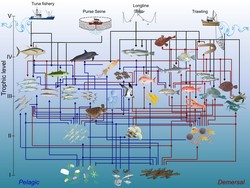Improved understanding of cumulative impacts on marine ecosystems
Marine ecosystems are extremely sensitive to outside influences, particularly human activities, such as pollution and fishing, and environmental influences like climate change. Although scientists have known about these influences for a long time, nobody has measured the cumulative or combined effects on ocean ecosystems. The EU-funded BIOWEB (Towards an ecosystem-based approach of marine resources: linking biodiversity, food webs, ecosystem services and drivers) initiative studied how human and environmental influences combine to affect food webs in the ocean. The aim was to determine how these factors impact on ecosystem health and services like food provision. Researchers collected biological and physical data from previous studies in the Mediterranean and other European seas and conducted large-scale meta-analysis to identify indicators and drivers of marine ecosystems in these bodies of water. New modelling tools were developed that incorporated the cumulative effects of human and environmental impact on these ecosystems. Researchers also analysed the results of microcosms in the laboratory – miniature ecosystems under controlled conditions that can be manipulated to understand how a natural ecosystem would respond to similar pressures. Results confirmed that the consideration of cumulative impacts is essential to understanding the dynamic behaviour of marine resources through time and space. This can result in structural and functional changes to marine ecosystems and impact the services they provide, such as food production and security. Fishing activities, for example, still have a major impact on marine resources worldwide and their impacts are particularly severe in areas with poor resource management. Habitat loss, pollution and eutrophication can also have a significant impact, particularly on coastal areas. Furthermore, in enclosed areas such as the Black Sea and Mediterranean, the impact of invasive species has increased exponentially and will continue to rise. Marine ecosystems are therefore changing, with a general trend towards ecosystems with smaller organisms and the growing importance of invertebrates, such as cephalopods, small crustaceans and jellyfish. These changes will render marine ecosystems more variable, less resilient to perturbations and thus more prone to change to unknown states when cumulative human impacts become too high. Thanks to the use of realistic analysis BIOWEB results have provided the knowledge needed to predict more accurately the cumulative effects of human and environmental influences on ocean ecosystems.







